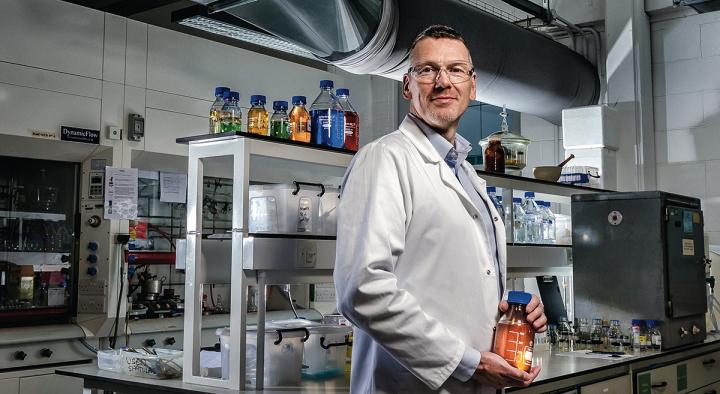Tapping into a greener goldmine
Chemists at the University are finding more efficient and environmentally friendly methods of gold extraction.

By developing a new way of recycling gold from electrical devices, researchers in the University’s School of Chemistry are part of wider efforts at Edinburgh to make a sustainable and socially responsible contribution to society.
An environmental technique
In 2017, a team led by Professor Jason Love revealed a new way of recovering gold from circuit boards used in electronics including televisions, computers and mobile phones.
Methods currently used to recover the precious metal are often inefficient or reliant upon toxic chemicals such as cyanide. Improving these recycling processes could help to cut carbon dioxide emissions and reduce the need for gold mining, a practice harmful to the environment. Seven per cent of the world’s gold is inside waste electronics and of that only 30 per cent is currently salvaged.
“As a society, we need to recognise that we have limited resources and that we can’t keep consuming these if we don’t have a way of returning them back to a useful state,” states Professor Love. “We have to think about how we can develop better ways of recycling, and we’re interested in the chemical aspects of how we do that.”
With an estimated 300 grams of gold present in every tonne of electronics, Professor Love and his team set out to develop a more sustainable and environmentally friendly approach that could allow for greater quantities of gold to be recycled. They formulated a new chemical reagent to use in a process called solvent extraction, which is used widely for the recovery of metals from ores. Compared to other methods such as smelting – which uses extremely high temperatures to separate mixtures of metals – solvent extraction is potentially a very environmentally friendly alternative.
As a society, we need to recognise that we have limited resources and that we can’t keep consuming these if we don’t have a way of returning them back to a useful state.
“The solvent extraction process has existed for decades but as chemists we’re trying to discover new and better reagents that recover metals more selectively,” explains Euan Doidge, a PhD student in Professor Love’s research group.
Using their new method, circuit boards are first placed in a mild acid to dissolve all their metal parts. An oily liquid containing the team’s reagent is then added, which allows gold to be extracted selectively from the complex mixture of metals found inside electronics.
“Our reagent allows us to recover a very high purity of gold, explains Euan. “Normally, one molecule of reagent binds directly to one metal molecule. Our compound uses a different type of chemistry, and can bind to clusters of gold molecules instead of just one. This means you can use a lot less of it to recover the same amount of gold.”
Three-Minute Thesis win
As a by-product of this research, Euan has enjoyed success in a science communication contest. After winning the University’s 2017 Three-Minute Thesis heat, he was awarded the People’s Choice award in the UK final. This has given him the opportunity to talk about his work at the world-famous Royal Institution, as well as enter into the Three-Minute Thesis international final.
As well as gold, the team is investigating ways of improving the recycling of other precious metals found in waste electronics, such as palladium, platinum, and rare earth elements like neodymium. New reagents could be developed to salvage these and common metals such as copper and tin.
There may also be the opportunity to extract toxic metals such as cadmium and lead, which can cause environmental issues that could, in turn, be prevented. The team is also interested in how chemistry could be used to recover plastics, not currently recycled, from mobile phones.
Promoting a circular economy
A big motivation for Professor Love and his team is the concept of the circular economy, which encourages reuse of materials and practising greater resource efficiency: “To develop a circular economy, we cannot waste these valuable resources,” says Professor Love. “If these materials could be recycled at the point of collection, it would provide lots of income to that local area. That doesn’t happen at the moment.”
In theory, the team’s new method could help to facilitate this development, because it can be carried out on a relatively small scale, which could enable local set-up. However, in order to make progress on the development of circular economy initiatives, collaboration is essential.
“Our aim is to build a whole theme of work at Edinburgh around urban mining and waste recycling,” explains Professor Love. “To do that we need more expertise in other areas, so we’re working with colleagues in geosciences, engineering and social sciences.”
Professor Love’s team is also working with the organisation Closing the Loop, an Amsterdam-based company that aims to reduce electronic waste by collecting old phones in Africa and bringing them to Europe to be recycled.
This commitment to making a socially responsible contribution to society is echoed across the University. Mr Dave Gorman is Director of the Department for Social Responsibility and Sustainability, which was established in 2014 to underline the University’s commitment to making a significant, sustainable and socially responsible contribution to the world. Mr Gorman believes that the many staff- and student-led initiatives at Edinburgh can help it deliver on this strategic ambition.
“Higher education institutions like Edinburgh can play a pivotal role in a transformation to a circular economy,” he states. “The work being done by Professor Love and his team is a great example of the kind of cutting-edge research going on at the University to help bring about the adoption of circular economy initiatives.”
Photo © Tricia Malley Ross Gillespie www.broaddaylightltd.co.uk

